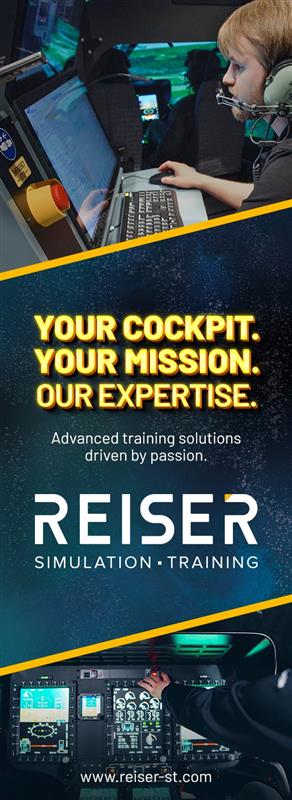AFM’s Managing Director Shares Thoughts on Saudi Arabia’s Pilot Training Infrastructure with Arabian Aerospace
AFM’s Managing Director Maximilian Buerger shared his view of the Kingdom of Saudi Arabia’s pilot training infrastructure with well known Middle East Aviation publication Arabian Aerospace. The article can be viewed here.
“The Kingdom of Saudi Arabia has set a specific goal as part of its Vision 2030 government plan – it aims to become one of the top global tourism destinations by 2030 welcoming 100 million visitors annually. To achieve this ambitious vision will require significant growth in air connectivity and the Kingdom’s airlines resulting in a steep increase in demand for qualified aviation personnel and training.
2023 has so far shown the airlines intention to meet this growth with announcements such as the launch of a second flag carrier Riyadh Air which placed an order for 39 Boeing B787 with options for 33 more, will start operations in 2025 and seeks to hire 700 pilots over the next three years. Another announcement signalling aircraft fleet growth came from Jeddah based flag carrier Saudia which announced in March this year that it had ordered a further 39 Boeing B787 with options for 10 more. On the narrow-body aircraft side the operators are also planning for huge fleet growth with fast growing low-cost carrier Flynas increasing its total firm orders to 120 Airbus A320 with plans to increase this to 250. As airlines in Saudi Arabia plan for significant fleet expansion the question becomes who will fly and maintain this fast-growing fleet?
To meet this growing demand for qualified aviation personnel the country has seen a significant development in the aviation training infrastructure over the last three years with a number of new organisations which launch as well as significant investment into expanding existing training infrastructure. Saudi Arabia’s training infrastructure has a long history with the longest running aviation training organisation, Prince Sultan Aviation Academy (PSAA), having been established in 1959 (initially as Saudia Pilot Training School). Today this Jeddah based training academy is the Kingdom’s leading aviation training hub conducting a wide range of courses from pilot training, aircraft maintenance training, cabin crew training, ground operation training and much more. Even during the challenging pandemic years Prince Sultan Aviation Academy planned for the future and placed an order for six additional simulators from global aviation solution provider L3Harris. It existing full flight simulator training infrastructure for the training of pilots is one of the largest in the region and is certified by the countries aviation regulator, General Authority of Civil Aviation, as well as a number of its pilot training simulators by European Aviation Safety Agency.
The training of new pilots has historically been conducted mostly outside of the Kingdom but also in this segment of the industry significant developments have been witnessed over the last three years with large scale investment into developing the countries own flight training organisations. The longest running flight school in the country AeroGuard Arabia (previously known as Rabigh Wings Aviation Academy) located in the west of the country announced in 2022 that it would be partnering with global pilot training group AeroGuard Flight Training Center to specifically focus on providing world class training for new pilots to join the growing airlines. Since the launch of this partnership the flight school has expanded its training capacity, focussed on optimising its training to the demand of airlines within Saudi Arabia and starting offering a program where aspiring pilots could get both a Saudi (GACA) and American (FAA) license. Another legacy flight training organisation driving expansion in the general aviation and pilot training infrastructure in the Kingdom is the Saudi Aviation Club (SAC) which is a nonprofit entity to promote aeronautical sciences and encourage the practice of aviation activities in Saudi Arabia with its main base of operations being at Thumamah Airport which is approximately 60 kilometers North of Riyadh.
On the east coast of the country, in Damman, we saw the opening of OxfordSaudia the country’s largest flight school and second largest in the Middle East with over 24 aircraft which aims to train hundreds of both Saudi and international aspiring pilots. OxfordSaudia celebrated the graduation of its first batch of pilots in August 2023, is increasing its training operations through the hiring of additional instructors and is continuesly introducing additional training aircraft with the latest being two Extra 300 aerobatic training aircraft (the first ones to be used by a flight school in the Kingdom of Saudi Arabia).
The latest flight school to launch in Saudi Arabia is Riyadh based Tayaran (The National Aviation Academy) which quickly partnered with well-known international aviation organisations BAE Systems SDT to offer aircraft maintenance training and Turkish advanced pilot training (flight simulator training) group IFTC to plan starting an Airbus A320 full flight simulator training center. Being based at Thumamah Airport, similar to the Saudi Aviation Club, means that for individuals living in Riyadh this is an ideal pilot training organisation to consider. All three flight training organisations, AeroGuard Arabia, OxfordSaudia and Tayaran currently offer programs which result in flight instructor employment following the graduation of training with them – signalling their desire to grow to meet the growing demand from airlines.
But is the existing pilot training infrastructure enough to meet the demand of the airlines? A number of announcements and indicators signal that more is desired. In July 2023 Riyadh Air announced the signing of an MoU with Prince Sultan University for both a graduate program and the building of a simulator training center for the training of aviation personnel on the Universities campus. Enhancing such partnerships between airlines and training organisations would lead to a rapid expansion of the Kingdoms training industry and most importantly provide young individuals with a clear career path – especially important for a costly education path such as pilot training. While an increasing number of foreign pilot training organisations market their training courses to Saudi airlines and aspiring pilots it is instrumental for Saudi airlines to support the emerging domestic pilot training infrastructure as it aim to scale at a rate not seen before in the Middle East and deliver in terms of training quality and performance to meet domestic demand. Over the coming 12 to 24 months we will likely see an increasing number of announcements of such partnerships as well as additional investment into expanding the training infrastructure be it training aircraft or flight simulators. As Vision 2030 sets out a clear target in terms of number of annual visitors – the Saudi pilot training industry could come together to set a similar target for training of pilots domestically which could then be supported by the different stakeholders be it the airline operators or GACA.”
AFM team note – to discuss the middle east pilot training demand and supply kindly contact us.
Source: AFM
You may also check our Terms and Conditions for our Content Policy.
Searching for specific information – kindly contact us to see if we can assist you.
Check out the more than 18467 relevant pilot training industry updates here.




